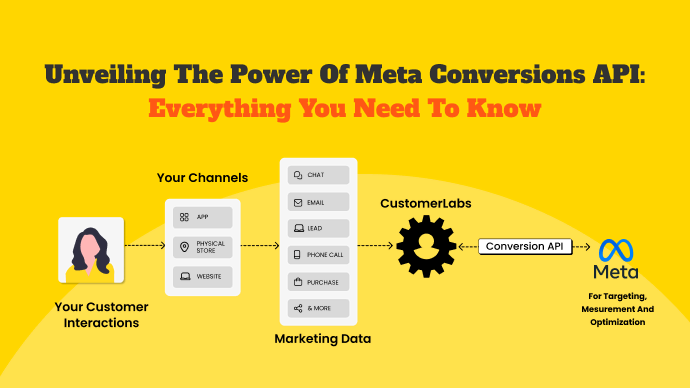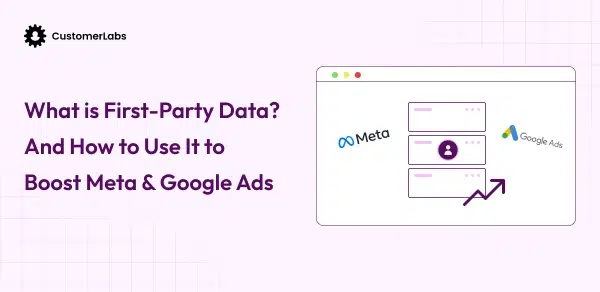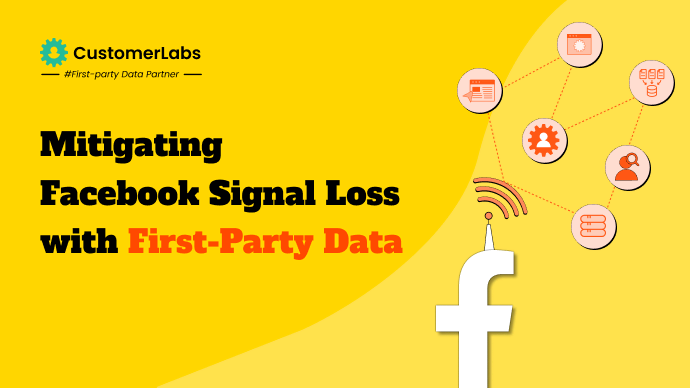The era of signal loss is here.
Between Google phasing out third-party cookies, Apple’s iOS 17 privacy updates, and increasing user consent restrictions, advertisers are losing visibility into who’s clicking, browsing, or buying.
That’s where Event Match Quality (EMQ), Meta’s hidden performance indicator, steps in.
Facebook recommends marketers to increase their event match quality to increase their ad campaign performance.
The better your EMQ score, the better Meta understands your audience — and the smarter your targeting, optimization, and attribution become.
Now let’s drill down more deeper by understanding the root cause of dips in the EMQ Score, why it matters and how to rectify them in quick easy steps.
What is Event Match Quality (EMQ) in Facebook Ads?
Event Match Quality measures how accurately Meta can match your website events (like purchases or leads) with real users in its database using identifiers like email, phone number, and external ID.
How Meta Calculates EMQ Score?
Meta calculates EMQ (Event Match Quality) in a very simple way.
The data you send is matched with the event instances (Probabilistic Matching & Deterministic Matching) to a Meta account within its database.
The event match quality is calculated cumulatively for the entire data you send.
Imagine you send Meta event data for 100 website visitors and you only include email, name, and phone number.
Meta can match most of those users correctly, but since you’re sharing only a few identifiers, your Event Match Quality (EMQ) ends up around 5/10.
Now, let’s say you send data for 500 visitors, where some are known (you have their contact info) and others are anonymous.
For known users, Meta can easily match emails and phone numbers. But for anonymous visitors (who don’t share contact details), Meta can’t find a perfect match, even if you send extra technical identifiers like browser IDs or click IDs.
As a result, your EMQ score may look lower, even though your actual targeting and ad performance can still be strong.

Now, let’s understand the importance or the impact EMQ Score creates on your campaigns.
Why EMQ Matters for Tracking, Attribution, and ROAS?
Remember this,
A high EMQ = stronger signals = better optimization = higher profits
Better Attribution: High EMQ means Meta can trace more conversions back to your ads, no more mysterious “untracked” sales.
Smarter Targeting: Matched events help Meta’s AI identify lookalikes of real buyers, improving audience quality.
Higher ROAS: When Meta gets accurate event data, it optimizes faster directly boosting return on ad spend.
Signal Resilience: With privacy changes limiting browser tracking, EMQ ensures your server-side data continues to feed Meta accurate signals.
Now, it would be clear, it does impact the way your campaigns bring in conversion, especially with the sequential learning that Meta does.
What is a Good EMQ Score ?
Meta rates each event from 0 to 10, or labels it as Poor, OK, Good, or Great. And a good Event Match Quality (EMQ) score in 2025 is 6 or higher, ideally above 8 for optimal ad performance.
| Rating | EMQ Score | Performance Insight |
| Great | 8–10 | Meta can reliably identify users and optimize efficiently |
| Good | 6–7 | Acceptable signal quality; some room for improvement |
| OK | 3–5 | Weak identifiers; limited matching and optimization |
| Poor | 0–2 | High signal loss; Meta can’t link data to users |
See what yours looks like. And here’s how you do it.
How To Check EMQ Score?
To check your current Event Match Quality Score:
- Navigate to Meta’s event manager by clicking on all tools
- Select Events manager and check the score beside every event.
- That gives the event match quality for every event.
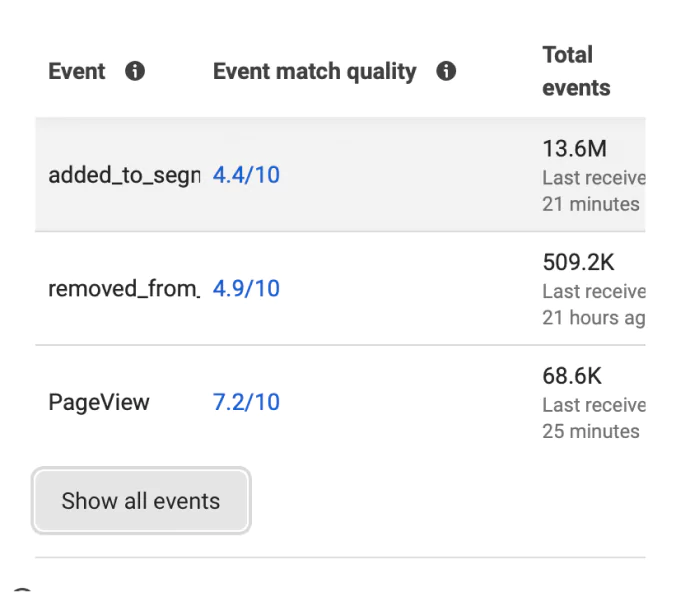
If you click on the rating, it gives you a clear detailed review of why your event match quality has a certain rating and suggestions as to how you can improve it.
Below is the example of how the event match quality is calculated by Meta and the suggestions it gives:
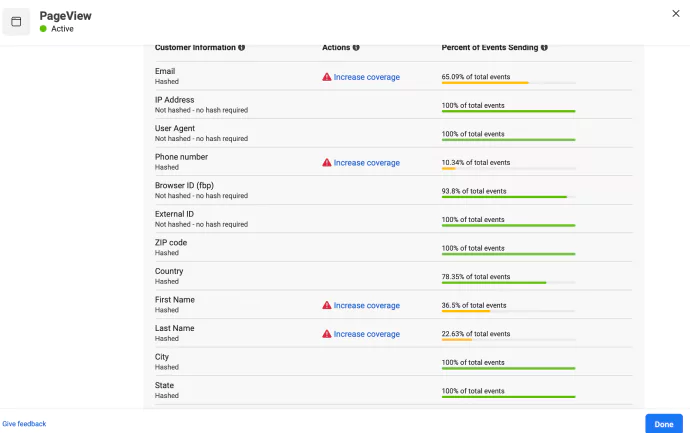
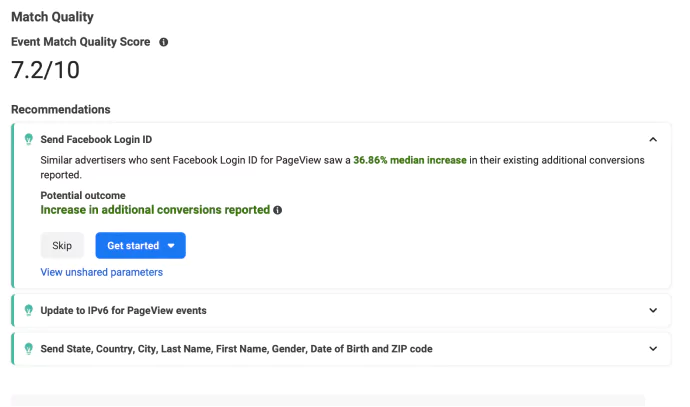
The next section is important, take a screenshot or save it in your PC for reference.
What Parameters Are Required for Good EMQ?
Meta is picky. Don’t think you can send phone numbers and email and get jackpot conversions.
Down below is the list of parameters and their priority.
I’m not saying this, Meta does.
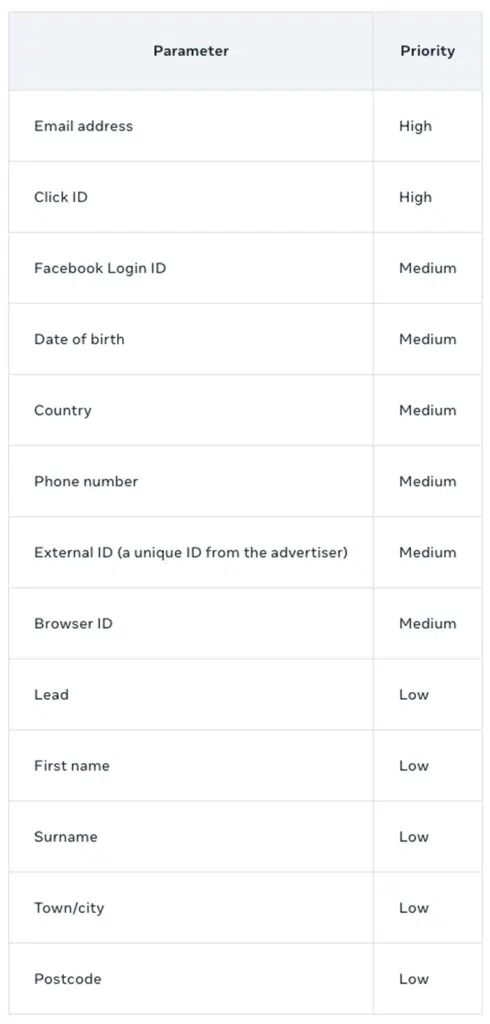
For more detailed information, please refer Meta’s official documentation on customer information parameters
Next up, get to know the major factors that can influence your EMQ Score.

What are Factors That Affect Event Match Quality?
1. First-Party Data Availability
Sending high-quality first-party data, especially the known information is what improves the event match quality because Facebook is able to match that data accurately with the users.
The more first-party data (emails, phone numbers, purchase history) you collect and sync, the higher the chance Meta can match those users accurately.
And remember, it is not just your known users, you can activate your anonymous users too!
2. Browser vs Server-Side Tracking
Meta’s pixel is the first and foremost tool that sends signals from the browser side to Meta Ads. However, Browser tracking (Pixel) is limited by cookies and privacy policies.
Server-side tracking happens via Meta Conversions API, it ensures you send data directly to Meta even when browsers block it. Plus it is privacy safe, so everything lays on how you optimize CAPI
See the image down below:
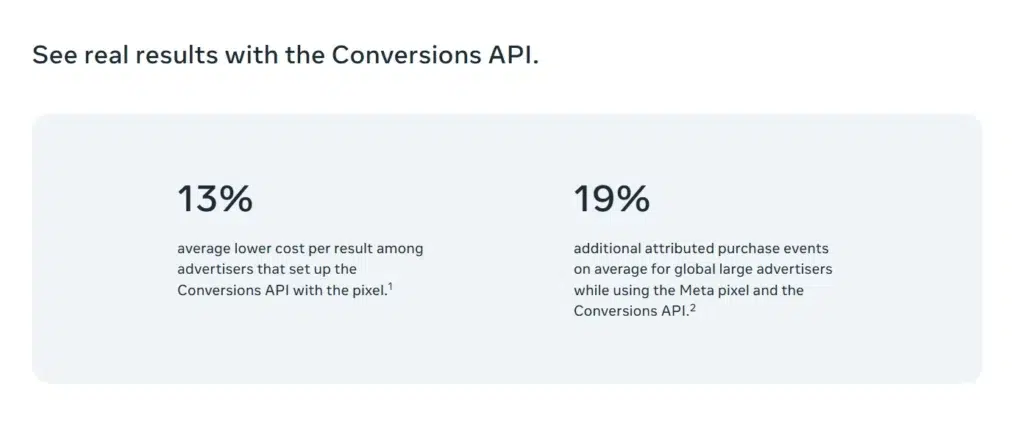
If you want to implement CAPI under 30 minutes and that too for free, start your free trial period now.
3. User Data Completeness
Meta’s Event Match Quality score depends heavily on the number and quality of identifiers you send with each event.
Identifiers are simply the data points Meta uses to recognize a user — things like email, phone number, external ID, browser ID, and click ID.
If your events only contain one or two identifiers (for example, just an email), Meta has limited ways to confirm who performed that action. That weakens your EMQ score.
However, when you send multiple identifiers, say, hashed email + phone + external ID + click ID; Meta gets a much clearer picture. This makes it far more confident about matching the event to an actual user in its database.
Here’s how it works in practice:
- Suppose a customer buys something while logged into your site — you can capture their hashed email, phone, and purchase ID.
- For another visitor who browses anonymously, you can still send fbp, fbc, or external ID via your Conversions API.
- By combining both known and anonymous identifiers, you create signal depth, which helps Meta connect more dots and improve attribution accuracy.
Pro tip: You can have external IDs pinned to your offline conversions and send them to ad platforms for more precise conversions.
Talk to those who do it with just a toggle on setup.
4. Signal Loss (Privacy Updates)
Apple’s App Tracking Transparency (ATT) limits cross-app tracking, iOS 17’s Link Tracking Protection strips user-identifying parameters from URLs, and Google Chrome’s third-party cookie phase-out is removing one of the last remaining ways to track users across websites.
Each of these changes cuts off bits of information that used to help Meta identify who took an action leading to incomplete data flow and lower EMQ.
Without mitigation, this means fewer matched events and a distorted view of your ad performance.

How to Improve Your EMQ Score?
| Step | What Happens | Impact on EMQ |
| 1. Connect data sources | Combine all 1P data in one place (website, Meta, GA4, etc) | Stronger identifier base |
| 2. Map events | Send structured, hashed data | Cleaner matching |
| 3. Enable CAPI | Server-side event delivery | Prevent signal loss |
| 4️. Test & monitor | Ensure setup accuracy | Reliable data flow |
| 5️. Enrich over time | Add new identifiers automatically | Continuous EMQ growth |
Step 1: Connect Your Data Sources
Start by connecting all your data sources; your website, CRM, eCommerce store, and marketing tools by using effective tools like 1PD Ops.
Step 2: Map Events and User Parameters
Map the events you want to send to Meta such as Page View, Add to Cart, Purchase, or any custom conversion event.
Step 3: Enable Meta Conversions API (No Code Setup)
Once your events are mapped, Enable Meta CAPI integration (just with a toggle on)
Sends the event data server-to-server ensuring it bypasses browser restrictions and data loss from iOS or cookie limits.
Step 4: Test and Monitor Event Delivery
Head to Meta Events Manager → Test Events tab to confirm that the data is being received properly.
Step 5: Iterate and Enrich Data Continuously
With tools like 1PD Ops you can enrich new identifiers as users interact with your site.
As more data is unified under a single external ID, your EMQ automatically improves; giving Meta better visibility for optimization and attribution.
Here’s a detailed guide on how you can automate event sharing to Meta’s CAPI without code.
Next up, some tricks that can be kept under your shelves.
Advanced Strategies to Improve EMQ Score
1. Use First-Party Data Pipelines
CustomerLabs helps you unify data from CRM, store, and website, building 360° user profiles that sync directly with Meta via server-side APIs.
This setup:
- Increases EMQ by 2–3x.
- Enables anonymous visitor retargeting.
- Creates stronger signal resilience across ad platforms.
2. Server-Side Event Deduplication
Ensure that every event sent via both Pixel and CAPI includes a shared event_id. This prevents double-counting and preserves clean attribution.
Automate this by using tools like 1PD Ops. It automatically syncs event IDs between browser and server, so you never send duplicate data to Meta.
After setup, check that each event appears once, under both Pixel and CAPI — with a “Deduplicated successfully” status.
3. Link EMQ Improvements to ROAS
Use A/B testing in Meta Ads Manager to correlate EMQ improvements with ROAS uplift.
Most brands see 20–40% higher conversion accuracy after boosting EMQ.
Compare ROAS, CPA, and matched conversions before and after implementing the setup to visualize the direct lift.
Conclusion
EMQ has a direct impact on conversions. And the data you send has a direct impact on EMQ.
To conclude, instead of compromising on your conversions, implement effective tools like 1PD Ops setup to increase the EMQ (event match quality) score in Facebook. The setup includes proper pixel setup with manual advanced matching turned on and Conversions API to give Facebook the complete picture of the user through the events.
CustomerLabs 1PD Ops helps you improve your event match quality and boost your ad campaign performance with the help of first-party data.
So, what are you waiting for? Get your event match quality to at least 6 and more by sending more data effectively to Meta’s ad platform.
Get started with the setup for free or pick a slot for a free consultation call with our experts.
